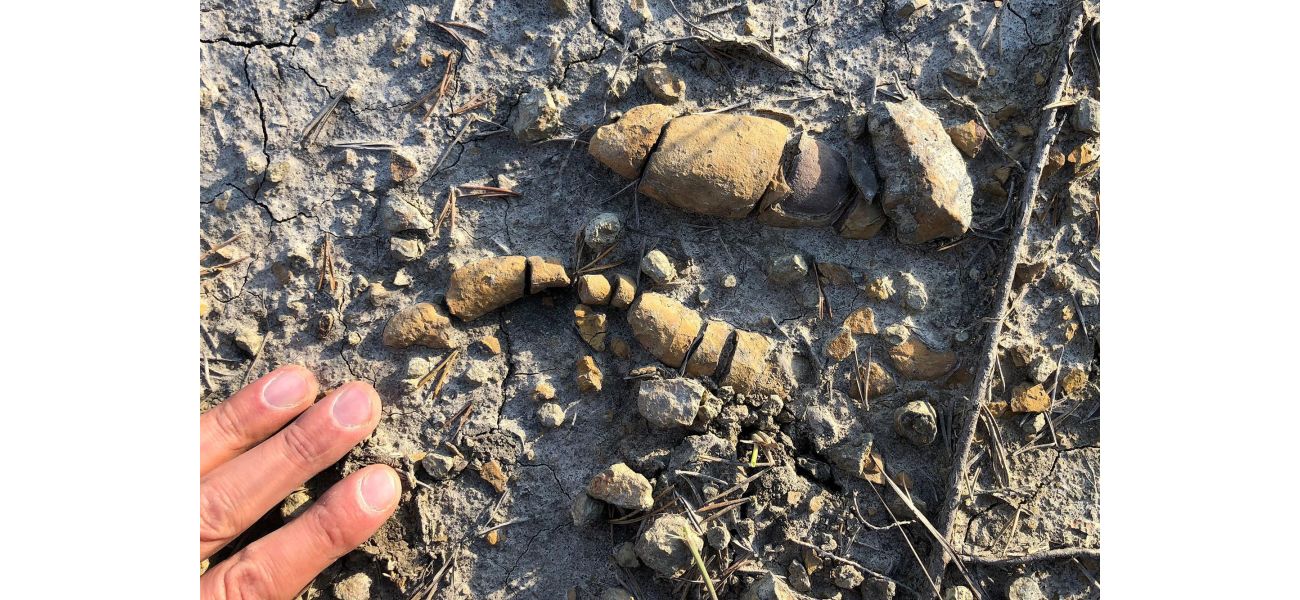Fossilized dung shows how dinosaurs ruled Earth.
Dinosaurs were insignificant creatures living among other reptiles on a densely populated supercontinent when they emerged 230 million years ago.
November 28th 2024.

In the beginning, dinosaurs were just one of many species living on the supercontinent, surrounded by a variety of ancient reptiles. But as time passed, they began to take over the planet. They came in all shapes and sizes, and their dominance was undeniable. Meanwhile, many of their reptilian counterparts died off, leaving the dinosaurs to reign supreme.
Despite their success, the reasons behind it have always been a mystery. However, a recent study has shed some light on this topic. According to Martin Qvarnström, a paleontologist at Uppsala University in Sweden and lead author of the study, the answers may lie in the remains left behind by dinosaurs: their droppings.
Qvarnström and his team focused on overlooked fossils known as bromalites, which are essentially ancient dung and vomit. They collected over 500 of these fossils from various sites in the Polish Basin, dating back to the Late Triassic to early Jurassic Period, around 247 to 200 million years ago.
The team found that these fossils increased in size and variety over time, indicating the emergence of larger animals and different diets. By studying the shape and contents of the bromalites, the researchers were able to identify and categorize the animals that likely produced them. This allowed them to understand how many and what type of dinosaurs, as well as other vertebrate animals, were present in a particular area at a given time.
This 10-year study revealed some interesting findings. For instance, the team was able to determine which type of dinosaur produced a particular bromalite based on its size and shape. However, for more detailed information, they had to use specialized equipment to scan the fossil's internal structure. This allowed them to identify the remains of fish, insects, plants, and other prey animals within the droppings.
The team also found that the bromalites contained bones crushed by predators, giving insight into the food chain in that particular area. Lawrence H Tanner, a paleontologist at Le Moyne College in New York, who was not involved in the study, stated that this research provides a transition from a world with few dinosaurs to one where they dominated.
Using advanced techniques and equipment, the researchers were able to reconstruct the rise of dinosaurs. They found five phases that explained their ascendancy. One key turning point was an increase in volcanic activity, which led to a more diverse range of plants for the dinosaurs to feed on. This, in turn, led to the emergence of larger and more diverse herbivorous dinosaurs, and eventually, the giant carnivorous dinosaurs we know and love.
However, all good things must come to an end. The reign of the dinosaurs was cut short by an asteroid that struck off the coast of Mexico 66 million years ago. Before this study, two theories were proposed to explain the transition from a world dominated by non-dinosaurian reptiles to one where dinosaurs ruled. One theory suggested that dinosaurs evolved to physically outcompete their rivals, while the other proposed that they were better able to adapt to dramatic changes in climate.
But the research based on the Polish fossils suggests that a combination of these two hypotheses is the most plausible explanation. The team found evidence that dinosaurs had a varied diet, including a wide array of plants. This diversity in their diet may have helped them cope with changing environmental conditions. For instance, the team discovered that charcoal in some coprolites helped detoxify toxic plants, suggesting that dinosaurs were able to adapt to new food sources.
In conclusion, the success of dinosaurs can be attributed to a complex interplay of several factors, including their ability to adapt to changing environments and their varied diet. Grzegorz Niedźwiedzki, the study's senior author, believes that this message still applies today: "Eat your veggies and live longer." So, the next time you see a dinosaur on screen or in a book, remember that their rise to dominance was not just a matter of luck, but a result of their resilience and adaptability.
Despite their success, the reasons behind it have always been a mystery. However, a recent study has shed some light on this topic. According to Martin Qvarnström, a paleontologist at Uppsala University in Sweden and lead author of the study, the answers may lie in the remains left behind by dinosaurs: their droppings.
Qvarnström and his team focused on overlooked fossils known as bromalites, which are essentially ancient dung and vomit. They collected over 500 of these fossils from various sites in the Polish Basin, dating back to the Late Triassic to early Jurassic Period, around 247 to 200 million years ago.
The team found that these fossils increased in size and variety over time, indicating the emergence of larger animals and different diets. By studying the shape and contents of the bromalites, the researchers were able to identify and categorize the animals that likely produced them. This allowed them to understand how many and what type of dinosaurs, as well as other vertebrate animals, were present in a particular area at a given time.
This 10-year study revealed some interesting findings. For instance, the team was able to determine which type of dinosaur produced a particular bromalite based on its size and shape. However, for more detailed information, they had to use specialized equipment to scan the fossil's internal structure. This allowed them to identify the remains of fish, insects, plants, and other prey animals within the droppings.
The team also found that the bromalites contained bones crushed by predators, giving insight into the food chain in that particular area. Lawrence H Tanner, a paleontologist at Le Moyne College in New York, who was not involved in the study, stated that this research provides a transition from a world with few dinosaurs to one where they dominated.
Using advanced techniques and equipment, the researchers were able to reconstruct the rise of dinosaurs. They found five phases that explained their ascendancy. One key turning point was an increase in volcanic activity, which led to a more diverse range of plants for the dinosaurs to feed on. This, in turn, led to the emergence of larger and more diverse herbivorous dinosaurs, and eventually, the giant carnivorous dinosaurs we know and love.
However, all good things must come to an end. The reign of the dinosaurs was cut short by an asteroid that struck off the coast of Mexico 66 million years ago. Before this study, two theories were proposed to explain the transition from a world dominated by non-dinosaurian reptiles to one where dinosaurs ruled. One theory suggested that dinosaurs evolved to physically outcompete their rivals, while the other proposed that they were better able to adapt to dramatic changes in climate.
But the research based on the Polish fossils suggests that a combination of these two hypotheses is the most plausible explanation. The team found evidence that dinosaurs had a varied diet, including a wide array of plants. This diversity in their diet may have helped them cope with changing environmental conditions. For instance, the team discovered that charcoal in some coprolites helped detoxify toxic plants, suggesting that dinosaurs were able to adapt to new food sources.
In conclusion, the success of dinosaurs can be attributed to a complex interplay of several factors, including their ability to adapt to changing environments and their varied diet. Grzegorz Niedźwiedzki, the study's senior author, believes that this message still applies today: "Eat your veggies and live longer." So, the next time you see a dinosaur on screen or in a book, remember that their rise to dominance was not just a matter of luck, but a result of their resilience and adaptability.
[This article has been trending online recently and has been generated with AI. Your feed is customized.]
[Generative AI is experimental.]
0
0
Submit Comment





